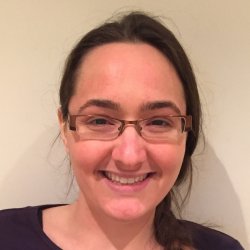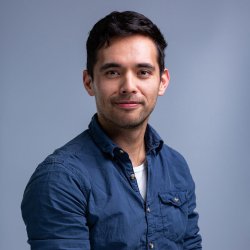Commercialisation Fellow Spotlight - Zoe M Harris
This year we thought it would be interesting to hear some early first-hand insights into the IAA Commercialisation Fellowship programme and the relationship between Research and Innovation, directly from the Fellows themselves.
Tell us about yourself, why you applied for this fellowship, and what you expect to gain
I am interested in agri-innovation, bioenergy and land use change. I work on vertical farming/controlled environment agriculture – this is a space dominated by start-ups who are exploiting the ‘sexiness’ of the technology and age old, unverified claims of sustainability e.g ‘90% less water’ – but like to ignore the massive energy footprint or deny the application of their tech (high value products, not supporting community equality). I want to use my scientific knowledge to do this better, encourage more Responsible Innovation that is more environmentally friendly, in a way that has a wider benefit for society. This fellowship will help me do that.
I have been awarded a project through the BEIS Biomass Feedstock Innovation programme. This is a 6-month project in which a full project proposal, with full commercialisation plan, needs to be developed and will allow us to bid for £4.5 million to take an innovation to market. I want to undertake this fellowship so I can get an understanding of the commercialisation processes – taking our research idea and moving it out into the market, and the best way to do that. By undertaking this fellowship I will be able to take more ownership of the commercialisation aspect of the research, in a more formal, structured way.
I have a basic understanding of commercialising research through talks I have attended over the years. I was in discussions to partner with an existing company to become a shareholder in a new enterprise but this did not pan out in the end. I have my own not-for-profit Theatre Company, and an independent consultancy. But I have no experience with technology transfer or commercialising research. I find the idea of business ‘scary’ due to its fast pace and competitive nature – I would like this dispelled as a myth, or to find a way to integrate myself comfortably in that space!
How would you define ‘innovation’, how does it fit within an academic environment, and how is it relevant?
Innovation for me is taking an idea and making it into a reality. Within an academic environment, it allows us to translate fundamental research into real life impact. This is important because most of our funding comes from research councils who are in part funded by taxpayer money, it’s important that we have a way of giving our research back to the people. Innovation (or impact) is increasingly becoming a priority for the research councils, and I suspect research grant applications will be reviewed through this lens.
What do you think are the biggest barriers to innovation for researchers at Surrey, in particular within your department or faculty, and how do you suggest we address these?
I think we need to get serious about innovation and the opportunities it brings for impact and income – and this needs to come from a culture shift, both top-down and bottom up. Innovation should be for everyone, not path you pick instead of academia but complementary to it. I can see how our internal Impact Acceleration Account (IAA) funding, which I’ve learnt is r-coded, can help support this shift in culture.
What are you plans over the next 12-18 months and how might this fellowship support those plans?
I am planning a Phase 2 bid for BEIS which involves a significant innovation component – we need to establish a commercialisation plan. The fellowship is providing me with the opportunity to increase my knowledge about innovation and tech transfer. It also provides me access to other comms fellows who are on this journey of discovery into all things innovation!
As an early career academic, I would have found it helpful to have some in the dept/faculty to have championed innovation and been a source of knowledge and support for me. So, I would like to be able to pay this back to the community having completed my commercialisation fellowship.
How has the start of your fellowship begun? Who have you met, what projects are you involved with, and what things have you already learned? – was anything unexpected? Did reality meet your expectations?
It has got off to a good start. I have been involved in the Lean Launch program which has provided a lot of great, action-driven ways of exploring markets for my innovation. I have had numerous conversations with Will M (Technology Transfer Manager, FEPS) about the project – exploring different routes to market, getting coaching on how to engage with stakeholders and questions around the innovation. Will has also been really useful in terms of signposting to others for support and guidance. I have massively expanded my business lingo – pivot, segments, return on investment! I have spoken to about 15 different stakeholders which has been really insightful and honed my communication skills. I was anxious starting as I find business and innovation all quite overwhelming, but that has settled somewhat. I thought engaging with stakeholders would be a lot more stressful – most are really nice and just want to help. I thought it would be a lot more competitive and ‘dog eat dog’, so this was a pleasant surprise.
If so, how has the fellowship changed your approach to innovation? What are your expectations for the rest of the fellowship e.g. things you’re looking forward to?
I think it’s more accessible than most people think, once you have got over the initial vocab-learning curve! It all seems a lot more possible with a lot of under-exploited opportunities, especially in academia. I think I would like to engage more with the other fellows, I am planning a couple of meeting at the moment, and also others on the innovation team.
What would you say to a prospective ECR considering applying to the fellowship?
If you’re not sure, just give it a go. It’s a good way to learn with relatively low risk. Your time is costed and covered so you don’t have to feel guilty or find it hard to carve out time from your contract/personal time to get the work done.
Survey
Question | 😱 | 😵💫 | 😐 | 🤓 | 🔥 |
|---|---|---|---|---|---|
Before your Fellowship, what was your practical understanding and application of impact, knowledge exchange and commercialisation activities? |
| ✅ |
|
|
|
Before your Fellowship, what was your understanding of IP? |
| ✅ |
|
|
|
Before your Fellowship, what was your awareness for the relevance of innovation to the academic career? |
|
| ✅ |
|
|
Before your Fellowship, how confident were you to approach industry with a commercial opportunity and to manage that relationship? | ✅ |
|
|
|
|
Before your Fellowship, what was your awareness of the Innovation Strategy teams and their functions? | ✅ |
|
|
|
|
Overall, how do you feel about Innovation now? |
|
|
| ✅ |
|


